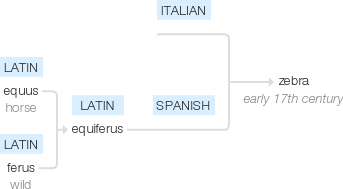Zebra
early 17th century: from Italian, Spanish, or Portuguese, originally in the sense ‘wild ass’, perhaps ultimately from Latin equiferus, from equus ‘horse’ + ferus ‘wild’.
wiktionary
1600; borrowed from Italian zebra, from Portuguese zebra, zebro(“zebra”), from Old Portuguese enzebro, ezebra, azebra(“wild ass”), from earlier cebrario (882), ezebrario (897), from Vulgar Latin *eciferus, from Latin equiferus(“wild horse”) (Pliny), from equus(“horse”) + ferus(“wild”).
(biracial person): The term zebra, as used in its pejorative sense, was popularized on the television situation comedy The Jeffersons. The term was used by the series protagonist, George Jefferson (Sherman Hemsley), to express disdain for his daughter-in-law, Jenny Willis Jefferson, whose father was white and mother was black.
While the word was traditionally pronounced with a long initial vowel in standard English, during the twentieth century a vowel shift occurred in regions of England, with the adoption of an initial short vowel. [1] This pronunciation is now used throughout the UK and most Commonwealth nations. The long vowel pronunciation remains standard in Canadian and American English.
(referee): In reference to the black and white striped shirts they wear.
etymonline
zebra (n.)
c. 1600, from Italian zebra, perhaps via Portuguese, earlier applied to a now-extinct wild ass, of uncertain origin, said to be Congolese [OED], or Amharic [Klein], but perhaps ultimately from Latin equiferus "wild horse," from equus "horse" (see equine) + ferus (see fierce). Related: Zebrine; zebroid.
